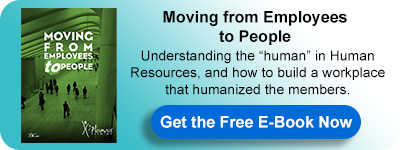A Workplace or a Utopia?
Managers and employers would usually seek an ideal workplace. According to most of them, a perfect workplace allows employees to come in, do their jobs, and leave quietly. In other words, a workplace that does not have much drama, where employees leave their emotions at home, come in, sit at their desks, and perform. In an ideal workplace, employees do not get bored. They can do mundane tasks over and over for years, promotion /development are not the top valuable things they expect from the employers, and do not get bored. It’s a workplace where employers needn’t worry about employees much.
Moreover, employees in such a workplace barely say “NO”. They don’t argue or criticize. In such an environment, employees are fast. After all, they are not crippled by emotions and problems. Therefore, they can work for long hours, are highly productive, and are accurate. 1
Wouldn’t this be perfect?
Definitely. Not much worry about employees' needs, and emotions! There are actually no emotions, to begin with! Didn’t they leave it at home in order to avoid its hassle at work? In fact, the image of such a workplace is more of a robotic one. No emotions, no drama, no communication, just work.
However, is there really such an idealistic workplace?
Well, let’s first explore the other side of the coin before we provide an answer to this question.
Humans have the ability to investigate, ask questions, and be open to new ideas and methods of operation. Therefore, employees might not ask questions, come in and perform as some managers wish. However, those who do, allow different thoughts and diversity into the decision-making and problem-solving process. Humans’ brains are wired to empathize, which is required to connect with others and form meaningful connections.
Hence, employers who prefer that employees leave their emotions at home will definitely create a hassle-free workplace, yet they will miss out on making meaningful, productive communications and connections whether their employees, or with their employees among each other, or with customers. The human brain is wired to create and impact emotions in various ways that even machines cannot mimic. After all, emotions are used to connect, empathize, connect, motivate, and influence. Leave your emotions at home might lead to drama-free zones, yet it will also lead to companies that resemble a body without a soul. 2
Therefore, if we look at “the” workplace from a different perspective, it’s actually that place that can provide a safe environment for employees to voice their thoughts and ideas. In addition, it allows employees to use their emotions wisely without inhibition. Moreover, it helps them voice their fears, handle them, and stir them in the right direction while offering care and creating positive interactions. It’s “the” workplace that allows employees to be the humans they are, with all their imperfections. It’s not the workplace that asks them to leave parts of them at home because they cannot handle it. Instead, it’s the organization that helps them deal with all their parts and treats them as a whole.
While some firms have managed to stay afloat by adopting such ideas, the organizations that create the ideal conditions for people to develop and innovate are the ones that will genuinely stand the test of time.
Today’s workforce can work on their own terms. Professionals are demanding humanized work environments where their opinions can be heard, and cooperation, inclusivity, and transparency are preserved. Financial reward alone is not enough to drive individuals to work hard.
1Wise, Health & Wealthy, Accessed 10 Dec 2021, https://www.wisehealthynwealthy.com/blog/advantages-and-disadvantages-of-robots
2 LinkedIn, 13 Feb 2020, Deanna Ong, Man Vs Machine: The Importance of Human Capital, Accessed 10 Dec 2021, https://www.linkedin.com/pulse/man-vs-machine-importance-human-capital-deanna-ong/
For more about this topic, download our latest book "Moving From Employees to People" for FREE:
